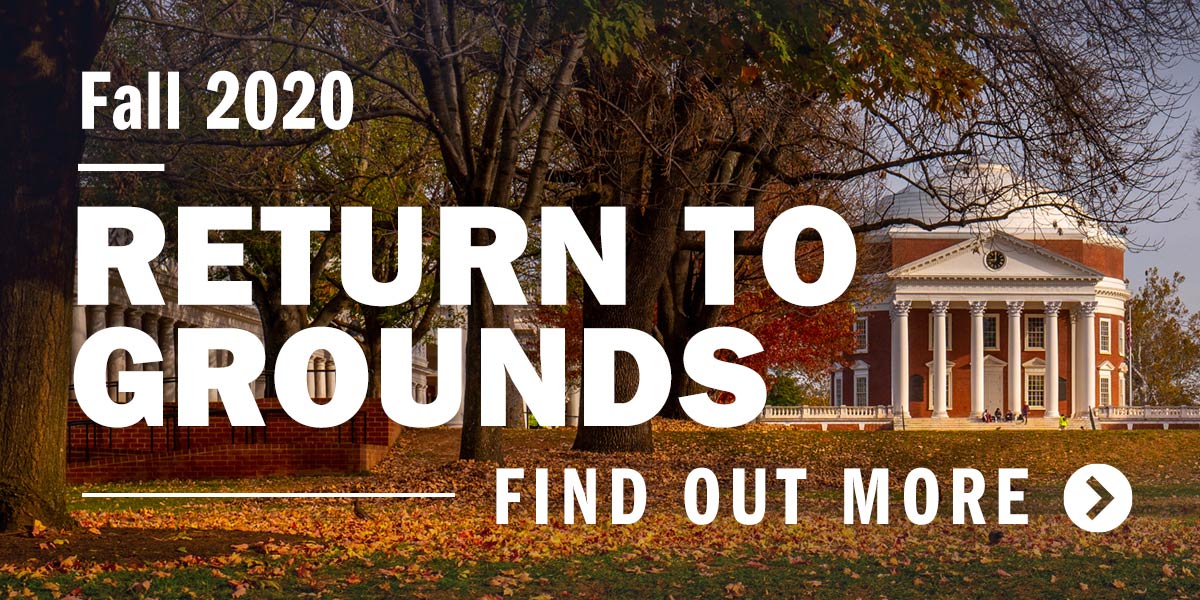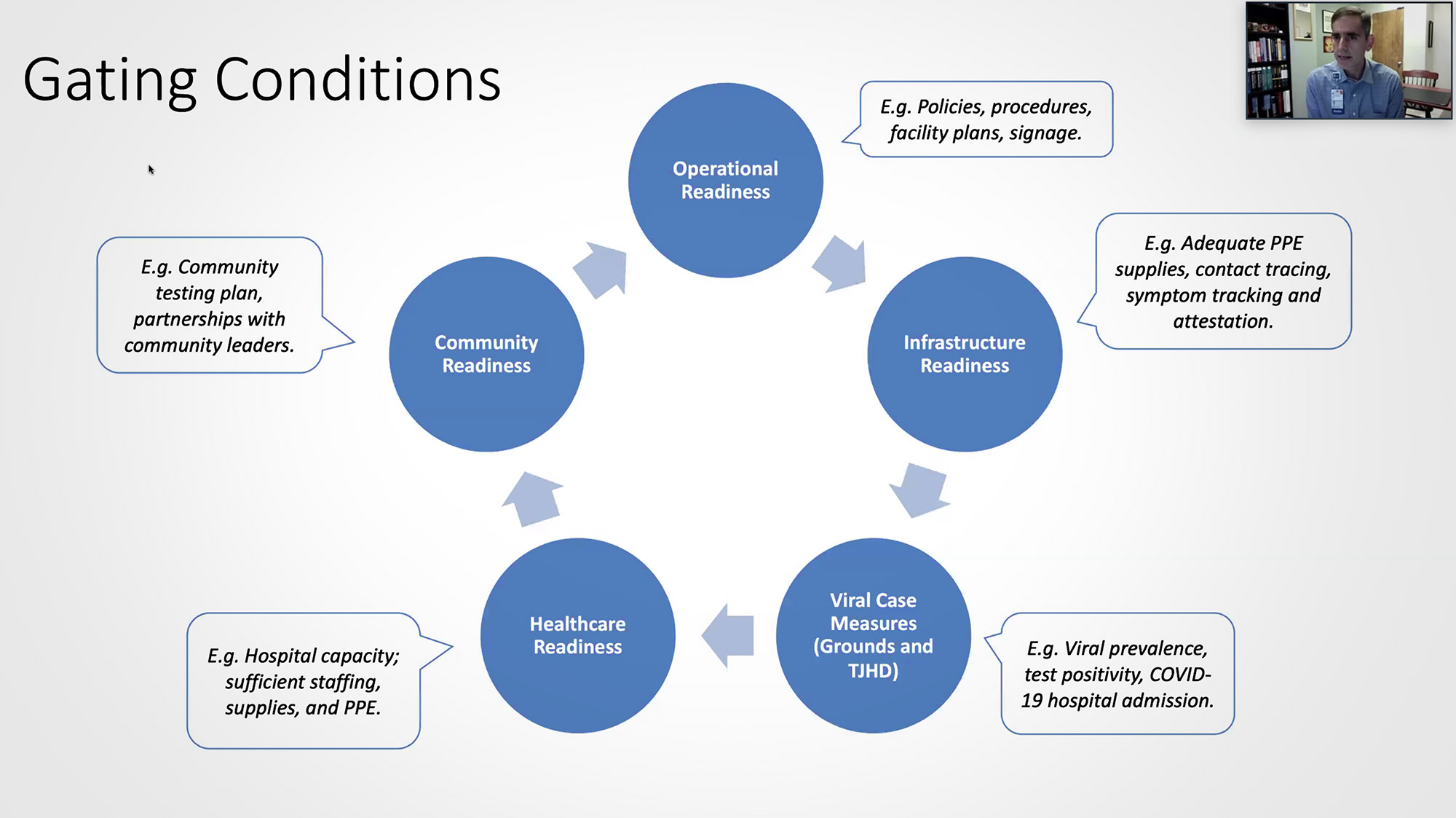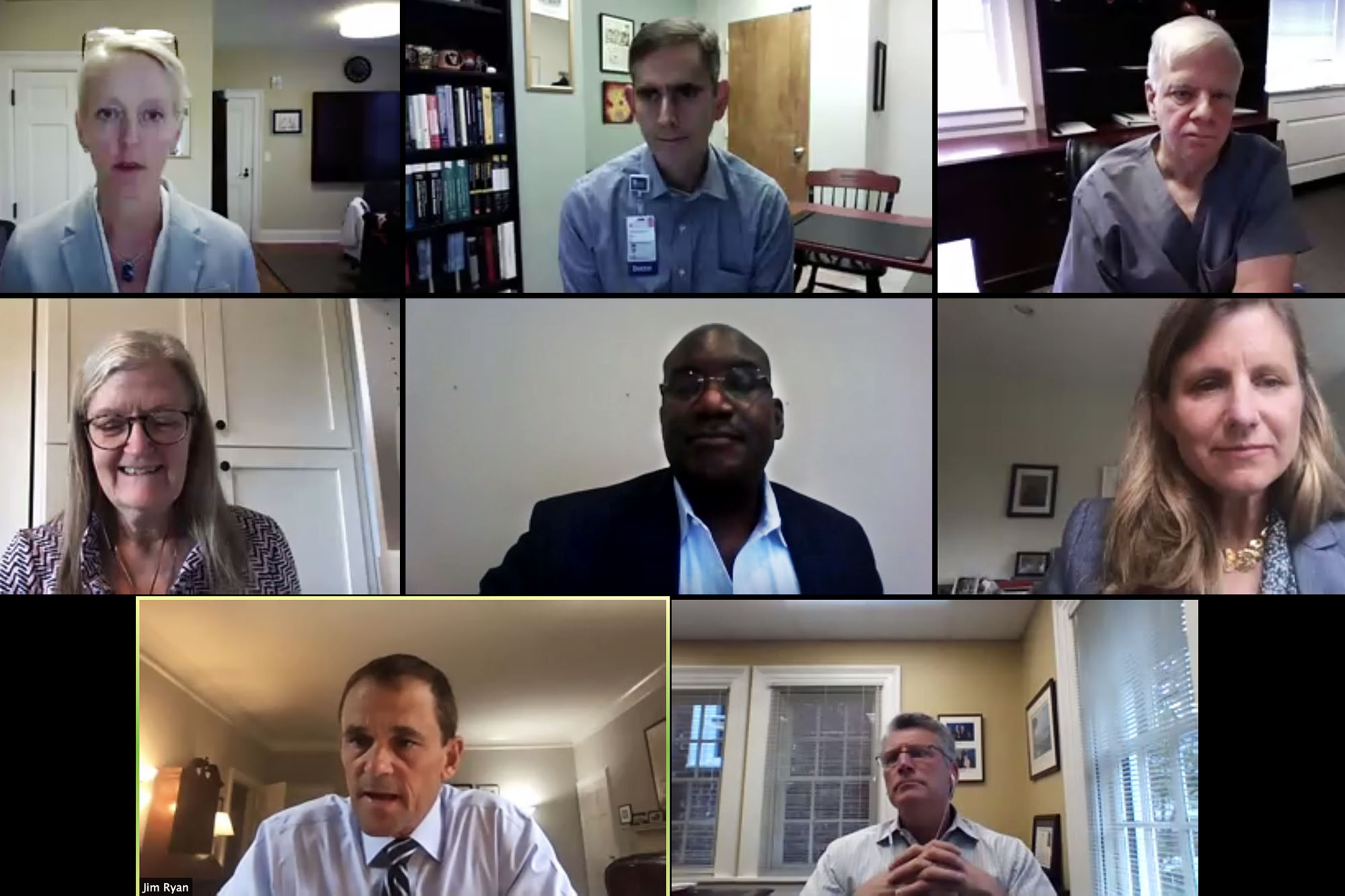In a virtual town hall Friday morning, University of Virginia President Jim Ryan and his leadership team answered questions from students, faculty and staff and covered a variety of topics related to the approaching fall semester.
Ryan opened the meeting by thanking students, faculty and staff for their hard work and cooperation thus far, and acknowledging the challenges ahead.
“This has been a remarkably difficult and challenging five months, and unfortunately it is not getting any easier. I know I speak for my colleagues in saying how grateful we are for all that you’ve been doing to allow us to continue our mission and to prepare for the fall,” Ryan said.
He was joined by Provost Liz Magill, Executive Vice President for Health Affairs Dr. K. Craig Kent, Director of Hospital Epidemiology Dr. Costi Sifri, Executive Vice President and Chief Operating Officer J.J. Davis, Vice Provost for Academic Affairs Archie Holmes Jr., Vice President and Chief Student Affairs Officer Patricia Lampkin, and University Counsel Timothy Heaphy.
You can view a full video of the town hall here. A similar town hall for community members will be held Monday at 5 p.m. (register here) and a town hall for parents will be held later in the week.
On Friday, each leader gave an overview of preparations in his or her area, ranging from classroom safety to testing and contact tracing, before answering some of the hundreds of questions submitted. Many of those questions will also be added to the FAQ section of the Return to Grounds site.

Ryan spoke first, detailing the reasons behind the University’s decision to delay undergraduate in-person instruction and move-in by two weeks, and re-stating his commitment to bringing students back to Grounds if possible.
“Our mission is to educate students, conduct research, and provide medical care. All of those things are better done in person, and students are involved in each part of that mission,” Ryan said. “That is why from the very beginning we have sought to have students return to Grounds, as long as we can do so in a reasonably safe manner.”
The two-week delay, Ryan said, stemmed from concerns about case increases locally and regionally, and disruptions in the supply of important testing materials needed to conduct testing and provide timely results. Leaders believe the additional time will help UVA ensure testing capacity for the semester and allow stricter public health ordinances adopted recently by Charlottesville and Albemarle County to take hold and slow virus transmission.
“We have spent a great deal of time working with public health experts at the University to develop a series of health and safety measures. … In particular we created a number of gating criteria [COVID benchmarks to be met, in terms of hospital preparedness, infection rates and testing] that need to be met in order for us to be comfortable bringing students back to Grounds,” he said.
“This phased approach will give us more time to track the progression of the virus, to make absolutely sure we have enough testing capacity for the semester and verify that the health and safety measures we are currently taking are continuing to work. It will also give us some time for the new restrictions adopted by Albemarle County and Charlottesville, which we endorsed and took effect on Aug. 1, to take hold.”
Sifri spoke next, walking attendees through several slides showing the criteria leaders are looking at and the progression of virus cases and hospitalizations locally and regionally.
Sifri noted that coronavirus cases in Virginia have been most concentrated in the Virginia Beach and Norfolk area, but that the Charlottesville region has seen a steady rise in cases since July 4.
“We are able to take care of these patients, but the trend is notable,” he said. “However, we have seen some improvement recently, which I think is commensurate with increased social distancing, masking and other things we should be doing to keep ourselves and others safe.”

Dr. Sifri outlined some of the gating conditions that leaders have been looking at, divided into five broad categories above.
Sifri and Kent also outlined the University’s plans for testing, including requiring all students coming to Charlottesville to take a test at home, providing testing for students, faculty and staff who experience symptoms, tracking symptoms through the Hoos Health Check app, conducting widespread community testing at four sites each week, and testing wastewater from high-risk areas like dorms to detect possible cases.
Kent addressed hospital capacity at UVA Health, noting that a new tower, completed ahead of schedule, has provided additional space for COVID-19 patients. UVA Health also has four COVID clinics set up throughout Charlottesville, and is home to 700 patient beds, along with an additional 150 patient beds at Martha Jefferson Hospital.
“In short, we are very prepared … Our capacity to care for people here in this community is extraordinary, and we have learned a lot about the virus in the past few months,” Kent said. “This is a wonderful time to have a great academic medical center associated with a university, and the talent of the team we have at UVA Health is extraordinary, with world-class individuals that know an incredible amount about the spread of infectious diseases and epidemiology.”
Davis addressed employee concerns, including safety precautions, accommodations for working remotely and child and elder care assistance, as well as steps the University is taking to prepare Grounds to accommodate physical distancing and provide all students, faculty and staff with personal protective equipment, including masks.
Magill and Holmes spoke about academic preparations, including the gradual return of some graduate students and researchers this summer.
“We had a phased reopening of research labs this summer, with 405 labs and more than 2,200 researchers, including about 850 Ph.D. students working in those labs under strict safety protocols, and that has gone remarkably well,” Magill said. “Graduate students in nursing and medicine have been doing clinical work, and as we speak graduate students are returning for in-person instruction in the Curry School, the Darden School and the McIntire School, all following strict safety protocols. We are very optimistic that it will continue to demonstrate that we can do this in a safe manner.”
She noted that physical distancing requirements have greatly reduced UVA’s classroom capacity, by about 2/3, resulting in the majority of courses either moving online or using a hybrid model. As of Wednesday, just under 30% of courses have an in-person component, Magill said, with about 23% of undergraduate courses offered in person, not including independent studies. Those numbers, Magill said, are comparable with other universities of similar size.
“We expect that this percentage is going to remain fluid in the coming weeks, as some faculty may elect to move their courses online and some may elect to go in the opposite direction,” she said. “Faculty across Grounds are also thinking about in-person opportunities that are not just classroom time, such as a chance to meet with a small number of students for office hours or spending time in a lab or studio.”
Lampkin and Heaphy addressed concerns about the student experience and expectations for complying with health measures. Lampkin and her office have been working closely with student leaders all summer.
“I have had the great good fortune to be working with our best attribute, our students, and we have been working alongside them since May to figure out how they can experience the UVA community in a safe and new way,” she said.
Both Lampkin and Heaphy said they hope enforcement of public health measures will be largely peer-driven and educational, as faculty, staff and students can remind their peers to wear masks, for example, or provide one from a supply in classrooms if someone forgets. However, they said, additional enforcement measures, including suspensions, are in place for repeated or flagrant violations, and any member of the community can report a violation through UVA’s Just Report It system.
Heaphy also noted that UVA’s standards of conduct apply not just on Grounds but throughout the Charlottesville/Albemarle area.
“Our standards of conduct apply beyond physical Grounds, throughout Charlottesville and Albemarle,” he said. “That has been the case all along and certainly is the case with specific public health mitigation measures.”
The leaders also addressed questions about gatherings, which will be limited to no more than 15 people.
“We have had ongoing conversations with student organizations, including fraternities and sororities, and they are in the process of understanding these policies and how they will implement them in a safe way,” Lampkin said during the Q&A portion. “Students have been engaged in these conversations all summer long so that they can come back and keep their peers, and faculty, staff and community members safe.”
The leaders answered as many of the hundreds of questions submitted as they could get to in the hour time frame. Additional questions and answers will be posted in the FAQ section of the Return to Grounds site.
Media Contact
Article Information
August 7, 2020
/content/friday-town-hall-answers-questions-students-faculty-staff

